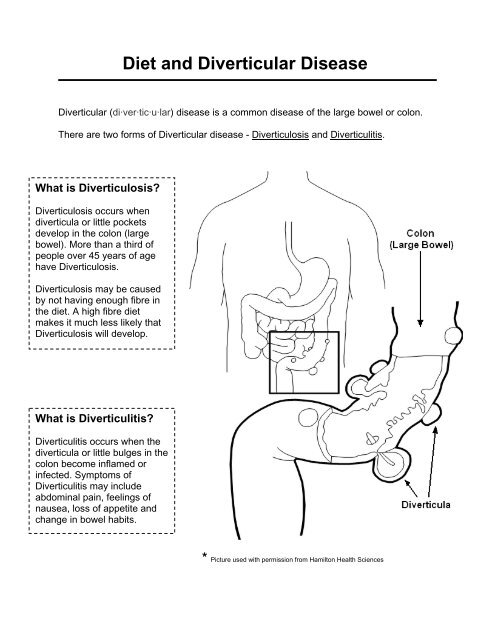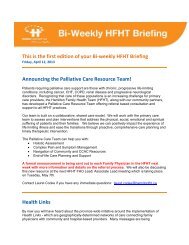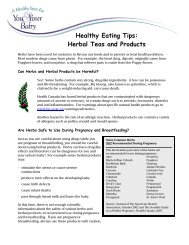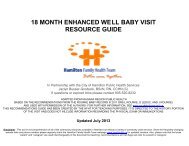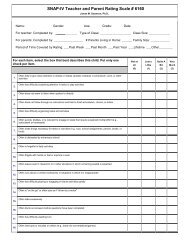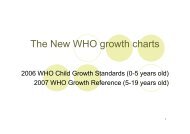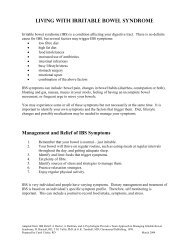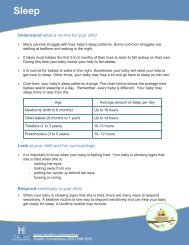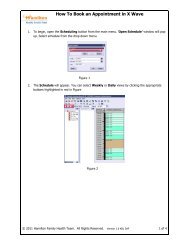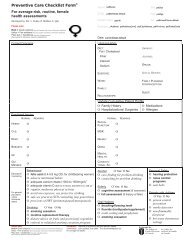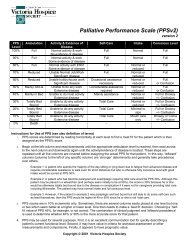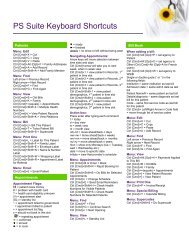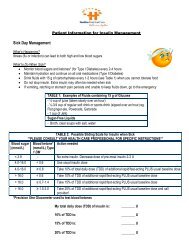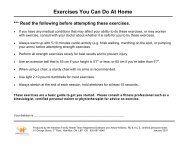Diet and Diverticular Disease - Hamilton Family Health Team
Diet and Diverticular Disease - Hamilton Family Health Team
Diet and Diverticular Disease - Hamilton Family Health Team
Create successful ePaper yourself
Turn your PDF publications into a flip-book with our unique Google optimized e-Paper software.
<strong>Diet</strong> <strong>and</strong> <strong>Diverticular</strong> <strong>Disease</strong><strong>Diverticular</strong> (di·ver·tic·u·lar) disease is a common disease of the large bowel or colon.There are two forms of <strong>Diverticular</strong> disease - Diverticulosis <strong>and</strong> Diverticulitis.What is Diverticulosis?Diverticulosis occurs whendiverticula or little pocketsdevelop in the colon (largebowel). More than a third ofpeople over 45 years of agehave Diverticulosis.Diverticulosis may be causedby not having enough fibre inthe diet. A high fibre dietmakes it much less likely thatDiverticulosis will develop.What is Diverticulitis?Diverticulitis occurs when thediverticula or little bulges in thecolon become inflamed orinfected. Symptoms ofDiverticulitis may includeabdominal pain, feelings ofnausea, loss of appetite <strong>and</strong>change in bowel habits.* Picture used with permission from <strong>Hamilton</strong> <strong>Health</strong> Sciences
Q. I have been told that I have Diverticulosis. What should I eat?A.Following a diet that is high in fibre <strong>and</strong> contains adequate fluid can help preventfurther problems with diverticular disease: Fibre: 20 – 35 grams per day Fluid: 6 - 8 cups per day (1.5 to 2 Litres)Higher fibre diets along with fluid <strong>and</strong> activity can help by preventing constipation <strong>and</strong>making stools softer <strong>and</strong> easier to pass. This reduces the pressure on the large bowel.See “High Fibre <strong>Diet</strong>” tip-sheet for information on choosing a high fibre diet.Q.A.Q.A.I am recovering from an episode of Diverticulitis. What should I eat?Following a low fibre diet for a brief period of time can allow your bowel to rest <strong>and</strong>heal. Follow a low fibre diet only until your symptoms have improved.See “The Low Fibre <strong>Diet</strong>” tip-sheet for information on choosing a low fibre diet.I have heard that it may not be safe to eat seeds <strong>and</strong> nuts when youhave <strong>Diverticular</strong> disease. Is this true?In the past, health professionals often recommended avoiding all seeds <strong>and</strong> nuts, butthere is no scientific evidence to support this practice. Eliminating seeds <strong>and</strong> nuts maylead you to reduce your intake the fruits, vegetables, fibre <strong>and</strong> heart healthy fats youneed to stay healthy <strong>and</strong> symptom free.Produced by the <strong>Hamilton</strong> <strong>Family</strong> <strong>Health</strong> <strong>Team</strong> Registered <strong>Diet</strong>itians10 George Street, 3 rd Floor, <strong>Hamilton</strong>, ON L8P 1C8. 905-667-4848April, 2008


